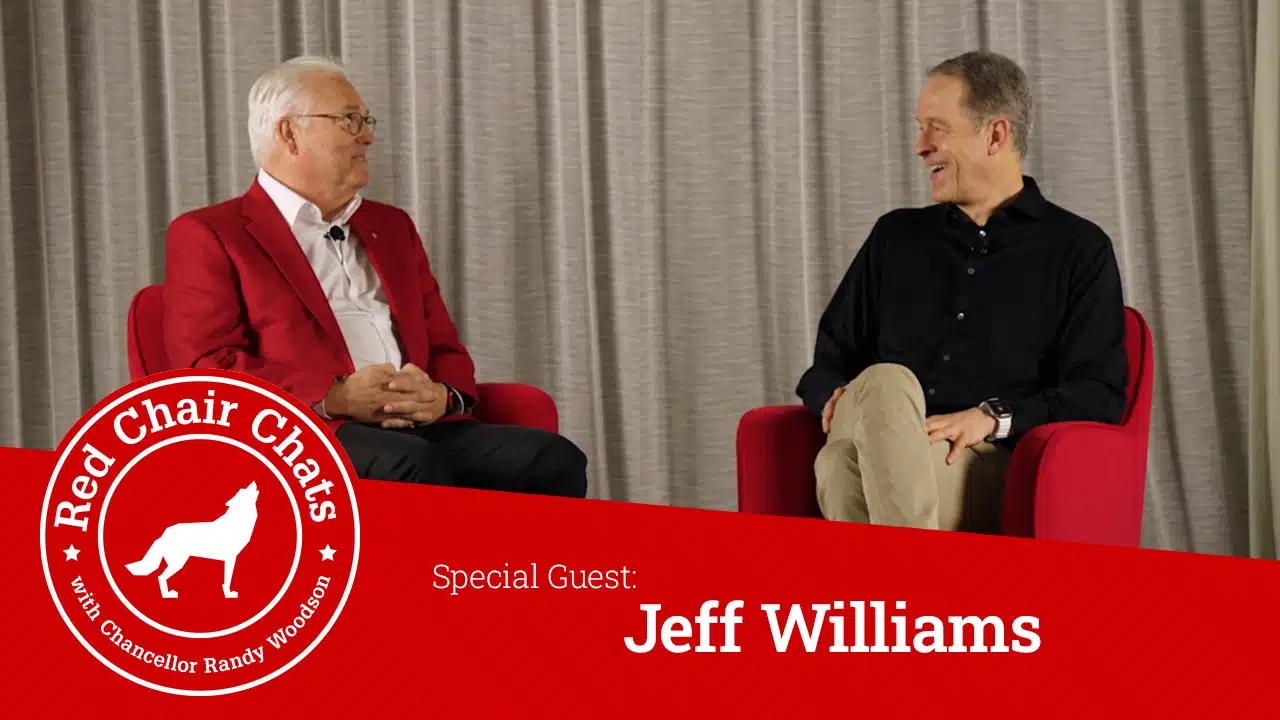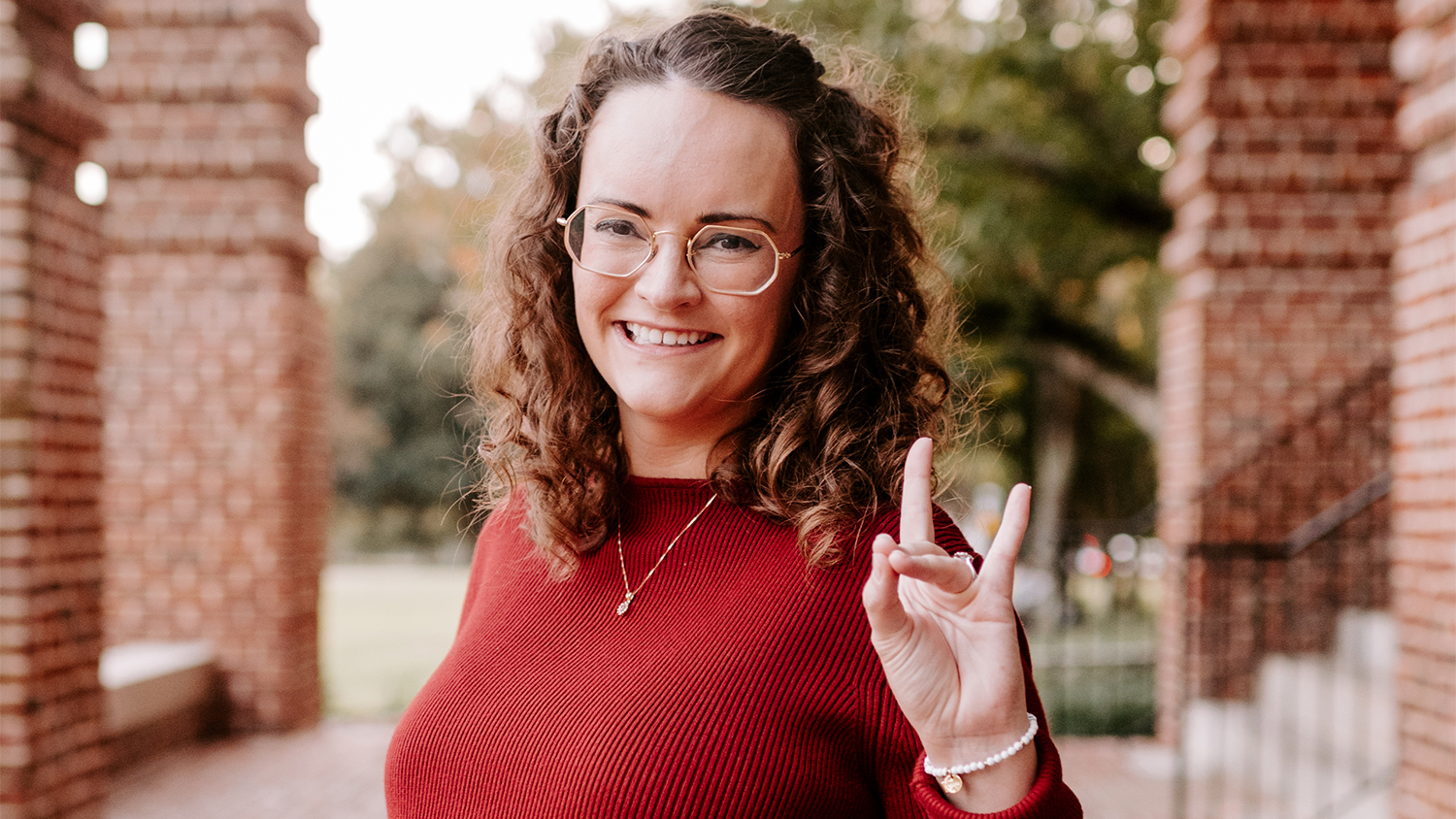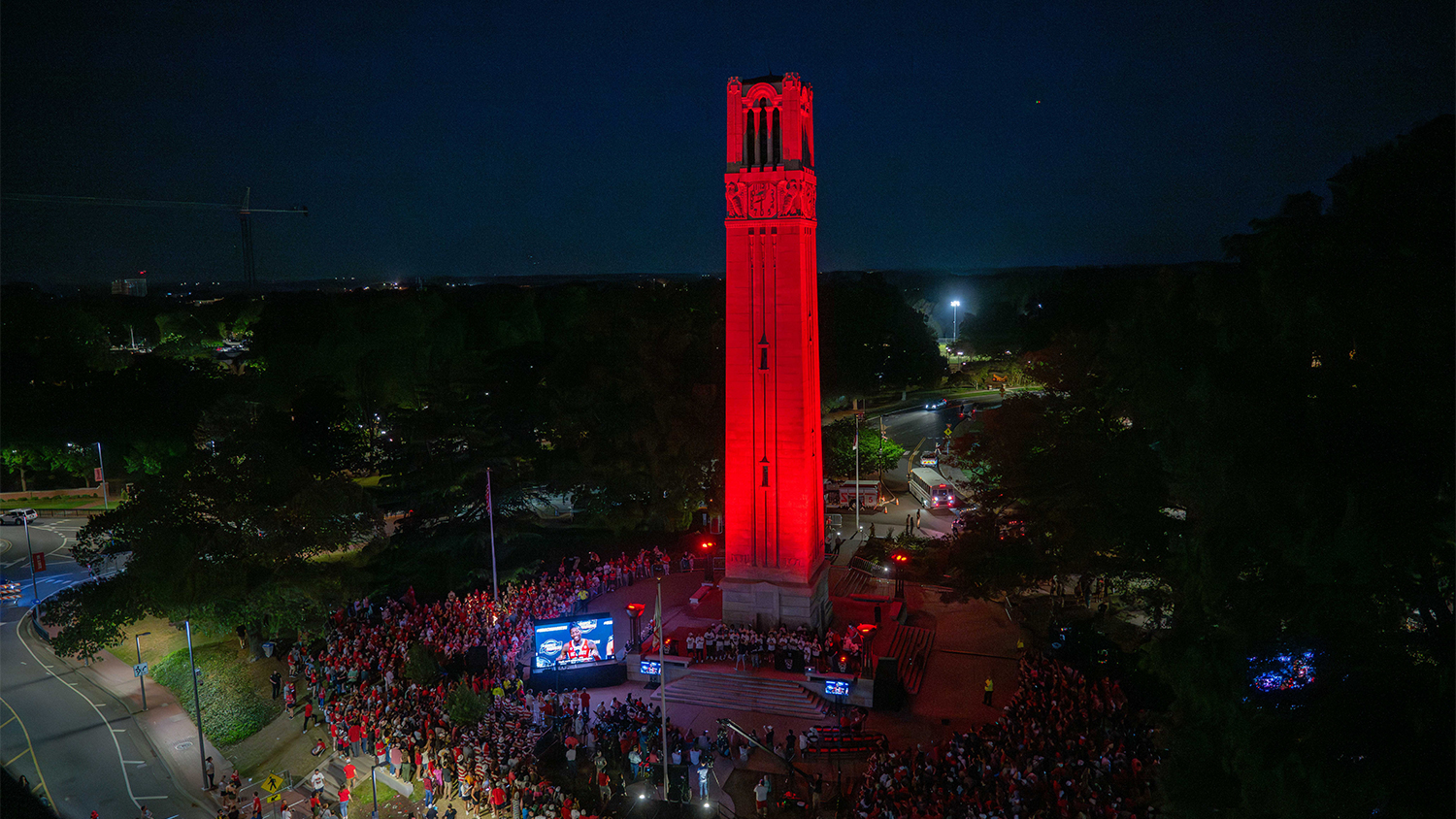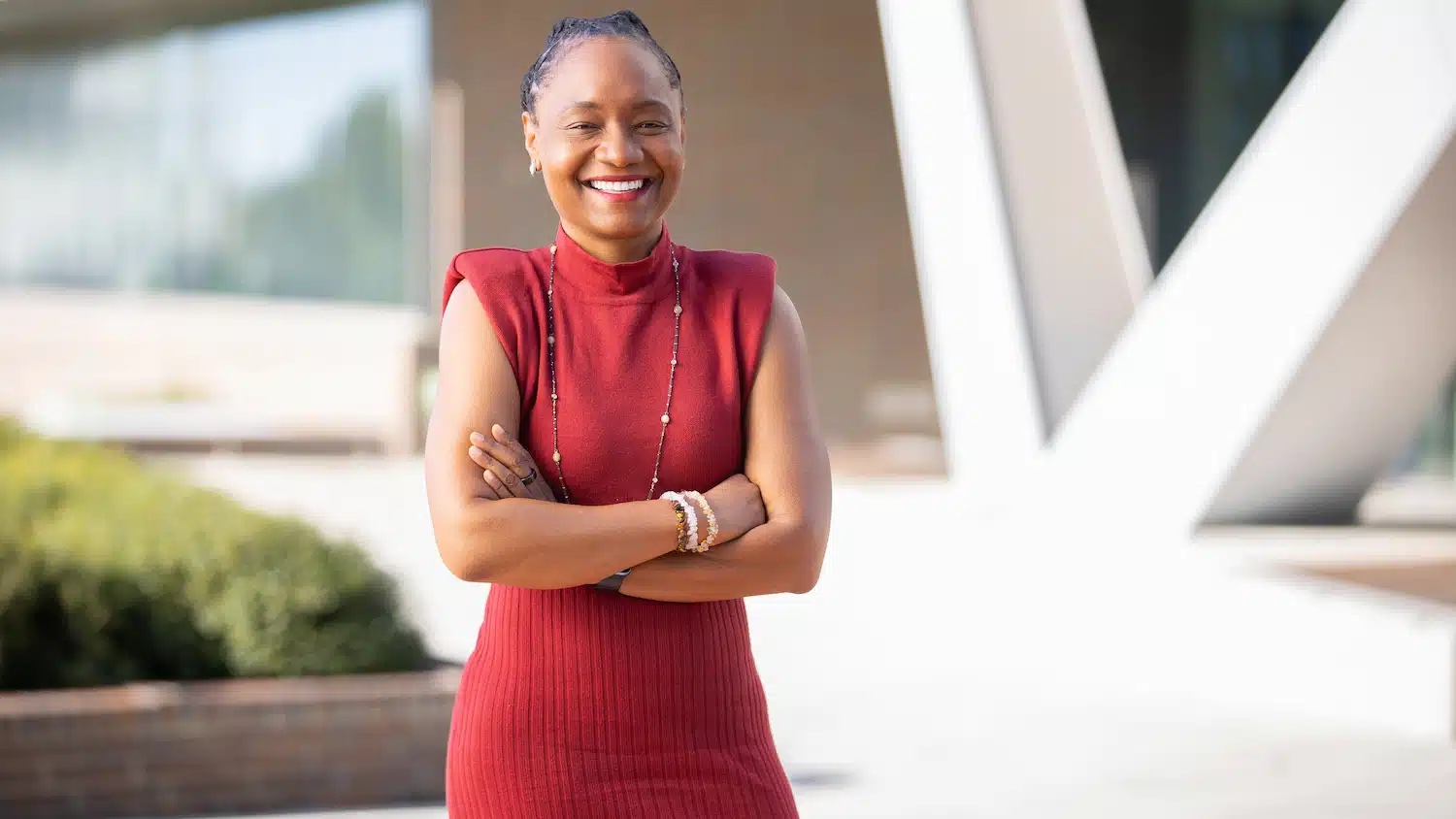The Intersection of Tech and Arts: Chancellor Woodson talks innovation with Apple COO Jeff Williams
Filmed in front of a live audience of NC State alumni, Chancellor Randy Woodson visits the Bay Area for a conversation with NC State alum and Apple COO Jeff Williams.
As the chief operating officer at Apple, Jeff Williams oversaw the development of the Apple Watch. But before working at one of the world’s biggest tech companies, Williams was a student at the NC State College of Engineering. Filmed in the Bay Area in front of a live audience of NC State alumni, Chancellor Randy Woodson talks with the 1985 graduate and 2021 honorary degree recipient about innovation and the importance of experiential learning in this episode of Red Chair Chats.
You can hear an audio version of this conversation on the Red Chair Chats podcast, available on Spotify and Apple Podcasts.
Transcript
Chancellor Woodson: Well, ladies and gentlemen, I don’t know how many of you have seen our Red Chair Chats that we’ve done with a variety of alumni and special people. It’s a big deal, and it’s really a big deal to be with Jeff Williams tonight. Jeff, as Brian said, is a 1985 graduate from mechanical engineering at NC State, and he may have had something to do with the phone in your pocket, or, notice the color?
Jeff Williams: Ooh, nicely done, nicely done. I can’t see it, but it’s red.
Chancellor Woodson: And the watch on many of our wrists. In fact, Jeff led the team that developed the iWatch. So he is Apple’s chief operating officer, and a great graduate of our university. So, tell us a bit about your time on campus, and talk about what it means. You’ve been back many times, and talk about what NC State meant to you and what it’s like to go back and see things after all those years.
Jeff Williams: Well, thanks, and thanks for joining tonight, and it’s great to be here. Gosh, NC State’s such a special place. When I go back, there are so many fond memories. I mean, when I walk through the Free Expression Tunnel, when I hit the Brickyard, when I pass the Belltower, what used to be on an engineering project, leaving for a run for Char-Grill, which is down the road, I think, and by the way, congratulations on the restoration of the Belltower that happened under your leadership. But I have so many fond memories. My favorite place, though, is Reynolds Coliseum. Even before I was, it goes back to when I was a little kid, my uncle was actually the voice of the Wolfpack for the radio station WPTF, a local radio station, and his name was Wally Ausley. So he announced the football games and the basketball games. And when I was a little kid, he would take me up in the crow’s nest, up in Reynolds Coliseum, because they used to play there instead of in the PNC Arena. So, that was special. And then when I went to school there, it happened across that 1983 time when Jim Valvano and the Wolfpack, it’s a little bit like last year’s journey, where it was just this, the Cardiac Pack that nobody believed in. And there was a big win, which was, so every time I’m on campus and I see Reynolds, I flash back to those moments and the pride in the university. And also, there’s just something about university days where there’s, I think, this combination of youth and optimism that really makes the university days special. And NC State’s just a wonderful part of our history.
Chancellor Woodson: You mentioned Reynolds. Have you been in Reynolds since it’s been renovated?
Jeff Williams: I have, I have, yeah.
Chancellor Woodson: What a phenomenal job.
Jeff Williams: It really, the renovations sort of kept some of the character, but it’s really well done.
Chancellor Woodson: It did, and I’m very proud of that. So, Brian mentioned in the introduction that in 2021, we were honored to honor you with an honorary doctorate. And it was, we were coming out of COVID, and so we wanted to have commencement, but we really needed to give people space. And so we did it in Carter-Finley.
Jeff Williams: Yeah, that was cool.
Chancellor Woodson: And that was for you.
Jeff Williams: Oh, well, I mean, how could it be otherwise? How could it be otherwise? I don’t know.
Chancellor Woodson: Well, and of course, Russell Wilson was-
Jeff Williams: I noticed, I noticed there. There’s always, yeah.
Chancellor Woodson: Well, and not that that’s a big deal, but everybody was there for Jeff Williams. But tell me, talk about what that meant to you, to be honored by.
Jeff Williams: It meant a lot. You see, my wife has her doctorate from an alleged university of higher learning down the road in Chapel Hill. And so, forever, we’ve been Dr. and Mr. Williams when we get, and so this degree was really important ’cause it leveled the playing field on the home turf. And so I really can’t thank you enough. I mean, that’s pretty much all it means to me.
Chancellor Woodson: Well, in fact, Melissa didn’t mention that, but she was a little concerned about-
Jeff Williams: She was.
Chancellor Woodson: You now being a doctor.
Jeff Williams: Yeah, on equal, at least equal standing, and maybe a little higher, given the university cred. So, no, I mean, it’s an amazing honor. I’ve met some people here who actually did all the hard work to get a doctorate, and I obviously did not. So I feel a little bit like a cheat, but I will take it shamelessly as I always would. So no, I genuinely treasure it. It’s a real honor, especially given my love for NC State.
Chancellor Woodson: Jeff, when you were a student at NC State, you had the honor of being a Caldwell Fellow. And for those of you that don’t know, the Caldwell Fellowship was established in honor of, without a doubt, the best chancellor that ever served NC State, John Caldwell. So talk about the Caldwell Fellowship, and I know you have a lot of fond memories of the support that you received during your time at NC State as a Caldwell Fellow.
Jeff Williams: Yeah, it’s interesting. I was not a Caldwell Scholar. Back then, there were, I think there were eight Caldwell Scholarships given, and I was not a Caldwell Scholar. I, but they had this, NC State had the fellows program, which was a leadership development program. It was run by Vice Chancellor Gerald Hawkins. He was vice chancellor of student affairs. But it was really, so there was a group of 20 freshmen selected, the eight that got the Caldwell Scholarship and then they had 12, think of ’em as walk-ons, sort of people that were selected, and the 20 of us went through a program that was really neat. It was focused on leadership development, which isn’t something that you generally talk about as a freshman in a university setting, but I heard about it and applied, and for whatever reason, they liked my BS or whatever, but I somehow got in. And it was really incredibly impactful in terms of exposing me to many things I wouldn’t have been exposed to in just the normal university environment. And the vice chancellor, Dean Hawkins, we called him, really took an interest, and really, that work helped shape me. In fact, he, my father died when I was 8, and I would say there’s a couple of people in my life that have been father figures, and he was one of them, and it was just really, really, really really helped sort of mold — he kind of believed in me when he probably shouldn’t have when I look at kind of how rough I was.
Chancellor Woodson: Well, I think he saw something clearly that he should have believed in.
Jeff Williams: You’re very kind.
Chancellor Woodson: Gerald, it’s a great example, Jeff, for me, because I’ve seen so many people, and you and Melissa led the effort in honoring Gerald in your support of the Caldwell Fellows, but there are so many people at NC State that have impacted other people’s lives, and those people’s lives that have been impacted have come back and done things in their honor. It reminds us, and it reminds me as chancellor, of how the people at the university impact so many people’s lives.
Jeff Williams: I agree.
Chancellor Woodson: And Gerald has done that with many students.
Jeff Williams: Yes, he has.
Chancellor Woodson: And you’re a great example of that. You and Melissa have been tremendous supporters at NC State, and one of the things that you’ve told me about the impact of the Caldwell Fellows program was the experiential learning opportunities, leadership, study abroad, things that really make a difference in a young person’s life. And thank you, because you have supported over 200 students of having experiential learning opportunities. So talk about why that’s important to you and why it’s been important for you to give back to the institution, to support students having those kind of experiences.
Jeff Williams: Sure. I’m a big believer in, obviously, the importance of the classroom, and that has to be a priority, but so much of my learning, and I’ve seen in others’ learning in their university days, happens outside of the classroom in terms of development. And there were so many opportunities, partially through the fellows program and others, that popped up for me that were foundational to me. I mean, I grew up in a really modest kind of environment, had never really traveled outside of the state. I mean, a couple times outside of the state, but not on an airplane, that kind of thing. And my freshman year, got a chance to go study Shakespeare at Oxford, kind of through NC State’s, had a study abroad program, and there was a scholarship from the American English Speaking Union that I applied for and couldn’t have done it without that. We didn’t have the resources, but just being over there was an experience. But also, the guy who taught it was one of the foremost authorities on Shakespeare in the world, and he took us to plays, and he really turned me on to Shakespeare and to the humanities. And I think that’s, you know, at Apple, we talk about the intersection of technology and the liberal arts, and I think I would have been a very different person had I not had that broadening experience. And there were others, be they internships or the Center for Creative Leadership or whatever, that I got exposed to at NC State. And so, I was so fortunate that somebody helped make that happen for me, that Melissa and I wanted to give back and are trying to support that for other students. But I do believe so much of the learning experience happens not only in the classroom, but through these other elements.
Chancellor Woodson: I can’t imagine that at your time at Oxford, you were surrounded by a lot of mechanical engineers studying Shakespeare, so that was, but you still stuck with mechanical engineering.
Jeff Williams: I did, I did, I did stick with it. I actually started as a chemical engineer and then switched into mechanical later, but I loved math and science as well. And so, I did stick with it, but I feel like there, and I have a greater appreciation for the importance of the sort of every day in my life, the sort of the non-technical side as well, I think.
Chancellor Woodson: Well, and I think that that’s one of the things that we do at NC State really well is marrying the liberal arts with a very technology-based university.
Jeff Williams: I agree.
Chancellor Woodson: Speaking of technology, so Apple is such an innovative company, always has been, and I’ve been a user throughout my life because, since computers were around, and so has my wife because she’s a graphic artist. And Apple was the early source for all things graphic. But talk about, we’ve got a lot of young people in the audience, and talk about how a company as bold as Apple thinks about innovation, and give advice to a lot of young people in the room about preparing to work in a workforce that needs innovation.
Jeff Williams: Work in a workforce that needs innovation. I think, it’s a great question. I have to think about that for a second.
Chancellor Woodson: I’ll give you another one if it’s too hard.
Jeff Williams: No, it’s not. In terms of the advice, I think, study deep in the engineering space, but I do think there’s this element of sort of the surrounding. When I think about innovation, I’d have different advice for just the innovation aspect than just the hardcore engineering aspect. The innovation piece at Apple is so interesting because ideas surface sort of anywhere across Apple. We don’t have the idea department or the innovation department or the innovation process or whatever, but they surface anywhere. And I think there has to be this continual sort of pulling on threads of ideas and kernels of ideas. And with that, you have to, you have to sometimes push past the rational and the practical. It may sound a little silly, but you take something like the phone, where the touchscreen was an enabling factor for the phone, and it seems obvious now, but it wasn’t. And there’s rational thought that would say, we had tactile buttons on the phone originally before the iPhone came along. And there’s lots of reasons why it wouldn’t work to touch glass. You can’t do it without looking at it, blah, blah, blah. And so you have to, you have to sometimes suspend disbelief and let ideas percolate. And so my advice for people who are looking in the innovative side of things is to take those kernels of ideas and let ’em bounce around for a while. ‘Cause I think we often get trained as engineers in the tech world to be very practical and logical, and there’s a piece of that. But I think this element of, sometimes that can be like an inert gas that’ll knock out any spark of creativity. And so that would be one piece of advice.
Chancellor Woodson: But Jeff, talk about, you started at Apple in 1998. Talk about your journey, not only at Apple, but to get to Apple. I know you were working-
Jeff Williams: I think, yeah, I think Steve said it best when he said in his famous graduation speech, you can only connect the dots looking backwards. And I certainly, that’s certainly the case for me. I was working at IBM, straight out of engineering school at NC State, and a great company. I had 13 different jobs in 13 years. They claimed it was some kind of executive grooming program, but honestly, I think it was each manager saying, “Here, you take him, I’m tired of him, and you pass him on,” like a hot potato. But my wife was working for Glaxo in the Triangle and doing pharmaceutical research. And we had our third kid and decided something had to give. We were, it’s funny, this was pre-COVID when you could just, in the airport, you could go all the way to the gate back in those days. And so I had the three kids, and she had a flight coming in from business and I had one going out. And we were gonna pass them at the airport. And her flight got delayed and I was looking around like, is there a bus locker I can put ’em in or something like that? I didn’t know what to do. And we realized something’s gotta give and I don’t remember how we ended up, whether it was a coin toss or whatever, we decided she was gonna take a leave of absence and I was gonna go, we’ll do something different and take an adventure. And I was gonna take a job with Dell Computer. They were on fire at the time. They were hot. Most of you are too young to remember that. But I was gonna take a job there. And out of courtesy, Tim Cook, who’s our current CEO, he had just joined Apple and I had worked with him at IBM, and he said, “Come out and check out Apple.” But I thought this is very low probability ’cause Apple was in really bad shape. But I came out, I can’t say no to Tim, and I came out for an interview, and I spent the day with people at Apple and ended up calling my wife saying, “What do you think about moving to Cupertino instead of Austin?” And she said, “Oh, do you think Apple’s gonna do well?” I go, “No, they’ll be belly-up in two years.” But there’s this contagious enthusiasm that I really wanna be a part of. Because it’s kind of funny, it’s hard to think of Apple in those terms now, but Apple had just lost a billion dollars, was almost, had to borrow money to make payroll. And I was in this interview with Steve and Steve was not as big a deal at the time. I didn’t know if his name was Jobes or Jobs at the time, but so I was kind of quasi asking him questions like, “Well, what’s your revenue growth plan?” And it was funny, he said, he looked at me and he said, “We’re gonna be the Sony of the PC industry.” ‘Cause Sony was really cool at that time, they had the Walkman and so forth. And he said, “We’re gonna bring fashion to computers.” It was right before the iMac came out. And the last thing he said is, he said, “We’re going after the consumer.” Because Apple at that time was chasing business enterprise and had walked away from the consumer. And I thought, “Guy, you do not know what the hell you’re talking about.” Because at IBM, we tried to make this PC Junior to sell to consumers, and it was a bloodbath. The margins were thin and blah, blah, blah, blah, blah. But history would say maybe he was right and I was wrong. But regardless, it’s one of the few right brain decisions I’ve ever made. 100% of the people told me, “It’s a really bad idea. Go to Dell or stay at IBM. You’re going places.” IBM felt like a big machine, and this felt like what I would imagine a Silicon Valley startup maybe on steroids would feel like. And it was just palpable, this contagious enthusiasm. And honestly, as big as we’ve gotten as a company, it still feels that way today to me. I still feel like I’m entering a big startup.
Chancellor Woodson: What a great story.
Jeff Williams: But anyway, that’s how I ended up there. I’ve just been the luckiest guy in the world to be able to work with all the amazing people I’ve worked with and under Steve and Tim’s leadership. And it’s just been an amazing journey.
Chancellor Woodson: Well, Apple has had these amazing, iconic products and one of which we’re wearing on our wrist and you were very involved in leading the team, working with the team to develop the iWatch. Talk a little bit about how that came to be.
Jeff Williams: Yeah, I think the, well, the Apple Watch, I give credit to the work in the design studio of people. Again, it’s these kernels of ideas and the idea is so important, but they were playing with the concept of maybe a watch and a screen that could be on your wrist and what, and starting to model that and look at that. And it’s again, another example where the idea could have been squashed early because sort of the rational thought at that time is, well, you got your phone with you and the screen on the phone’s bigger. It’s gonna be better and you can do stuff on the phone. So why do you need another one on your wrist, and what’s the- So it could have been snubbed out early as an idea, but the team kept pulling on threads and concluded there’s real value in sort of the end glance in the moment and then pulling on more threads and saying, you know, we got this real opportunity to impact people’s health. And we pulled in people from the fashion industry because this is the first wearable kind of thing versus the other products that you carry, and pull on all of those threads. And it’s really just part of the magic Apple process of everybody being involved and following thoughts. And of course, there’s the deep engineering rigor to go pursue and make the product. But in terms of the creation of these, it’s really neat. I mean, we get so many letters. Every single morning I wake up, there’s letters from someone wearing the Apple Watch who writes us to say that it made such an impact on their health and in many cases helped save their life because of the heart rate monitoring and other things that people will- And it’s been incredibly rewarding for all of the team that’s worked on that. But when I think of the nuggets and the ideas and the very start, I think we had no idea where the journey would take us. But I think it’s this notion of letting ideas develop and then following those that Apple as a company is so good at.
Chancellor Woodson: They, you really are.
Susan Woodson: My watch is telling me to stand up.
Jeff Williams: You’re gonna live a long time, Susan. So you just pay attention to that watch.
Chancellor Woodson: Ladies and gentlemen, that’s Susan Woodson.
Jeff Williams: She’s here all night. She’s here all night, folks.
Chancellor Woodson: We’ll be in a city near you soon. Well, thank you for joining us for another episode of Red Chair Chats. And thank Jeff Williams for everything that he’s done as an NC State graduate and what he continues to do at Apple. It’s a thrill to have you with us tonight. So thank you all for joining us.
Jeff Williams: Whoa, whoa, whoa, is this thing getting ready to end? Because I’m gonna ask you a question. You’re the retiring chancellor.
Chancellor Woodson: Whoa, whoa, whoa, no, that wasn’t.
Jeff Williams: I know it wasn’t, but I’m calling an audible. I’m calling an audible. After 15 amazing years, and, you know, I have tremendous respect for what John Caldwell did as well. But I think there’s somebody in the running there for best chancellor at NC State. You’ve done a phenomenal job. And we need something. And I, maybe two questions. One, you wake up and your house is on fire.
Chancellor Woodson: That actually happened.
Jeff Williams: There’s Susan. There’s your dogs. And there’s your guitar collection. What do you grab in what order?
Chancellor Woodson: All of the guitars or?
Jeff Williams: All of them.
Chancellor Woodson: Well, I mean, I’m gonna start with Susan.
Jeff Williams: That’s a good answer, especially with her on the front row.
Chancellor Woodson: And yeah, but then there would be one guitar that would be right after that.
Jeff Williams: On behalf of all the alum and students, thank you for your leadership over the past 15 years.
Chancellor Woodson: It’s been a pleasure, thank you.
This post was originally published in NC State News.
- Categories:



